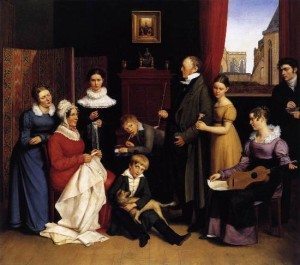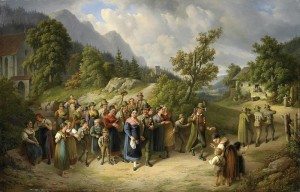
The Begas Family by BEGAS, Carl the Elder.
Experience shows that a family’s vitality and unity are usually in direct proportion to its fecundity.In large families, the children normally look up to the parents as leaders of a sizeable community, given the number of its members as well as the considerable religious, moral, cultural, and material values inherent to the family unit. This surrounds parental authority with prestige.
The parents are, in a way, a common good of all the children. Thus, it is normal that none of the children try to monopolize all the parents’ attention and affection, making of them a merely individual good. Jealousy among siblings finds scant favorable ground in large families. On the contrary, it can easily arise in families with few children.
Tension between parents and children is also frequent in small families and tends to result in one side tyrannizing the other. For example, parents can abuse their authority by absenting themselves from the home in order to spend their free time in worldly entertainments, leaving the children to the mercenary care of baby-sitters or scattered in the chaos of turbulent boarding schools devoid of any real affection. Parents can also tyrannize their children through various forms of family violence, so cruel and so frequent in our de-Christianized society.
 Learn All About the Prophecies of Our Lady of Good Success About Our Times
Learn All About the Prophecies of Our Lady of Good Success About Our Times
In larger families, these domestic tyrannies become less likely. The children perceive more clearly how much they weigh upon their parents, and therefore tend to be grateful, helping them reverently, and, at the appropriate time, sharing the burdens of family affairs.
On the other hand, a large number of children brings to the home liveliness and joy, and an endless creative originality in ways of being, acting, feeling, and analyzing reality both inside and outside the home. Family conviviality becomes a school of wisdom and experience made up of a tradition solicitously communicated by the parents and prudently renewed by the children. The family thus constitutes a small world, at once open and closed to the influences of the outside world.

Wedding in the Village by Carl Pelz.
The cohesion of this small world results from all the aforementioned factors. It is strengthened mainly by the religious and moral formation given by the parents in consonance with the parish priest, and by the harmonic convergence of inherited physical and moral qualities that contribute to model the personalities of the children.
Taken from Nobility and Analogous Traditional Elites in the Allocutions of Pius XII: A Theme Illuminating American Social History, by Plinio Corrêa de Oliveira (York, Penn.: The American Society for the Defense of Tradition, Family, and Property, 1993), pp. 90-91.
Editorial Comment:
Catholic social doctrine has always affirmed that the family is the basic building block of society.
Today, this God-created institution finds itself in a great crisis, beset by multiple threats: Socialism strips away parents’ authority over their children; like sulfuric acid, the sexual revolution corrodes the affection and fidelity of spouses; anarchical urges pit children against their parents.
Society must continue though and it will turn again to the family as its wellspring. The renewed life it seeks will come from regularly established and loving families who are resistant to the evils in our culture and nourish and strengthen their family bonds in the inexhaustible waters of Christian charity.

